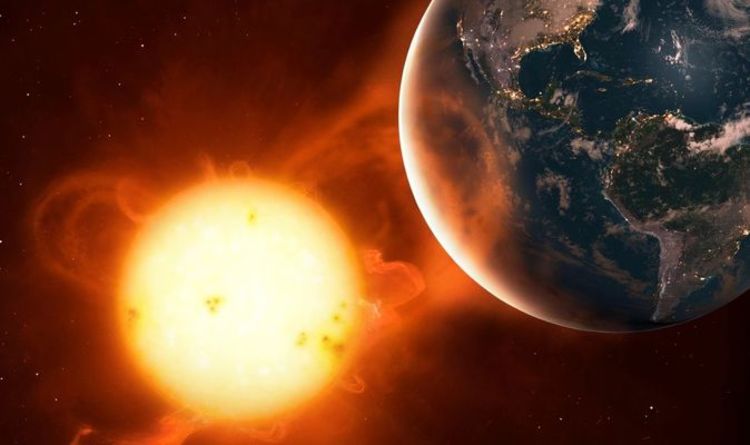Shock wave from sun has opened up a crack in Earth’s magnetic field, and it could trigger a geomagnetic storm
3 min read
A mysterious shock wave in a gust of solar wind has sent a barrage of high-speed material smashing into Earth’s magnetic field, opening up a crack in the magnetosphere. The barrage of plasma could lead to a geomagnetic storm today (Dec. 19), according to spaceweather.com.
The shockwave’s origins aren’t exactly known, but scientists think it could have come from a coronal mass ejection launched by the sunspot AR3165, a fizzing region on the sun’s surface that released a flurry of at least eight solar flares on Dec. 14, causing a brief radio blackout over the Atlantic Ocean.
Sunspots are areas on the sun’s surface where powerful magnetic fields, created by the flow of electrical charges, knot into kinks before suddenly snapping. The resulting release of energy launches bursts of radiation called solar flares, or plumes of solar material called coronal mass ejections (CMEs). Once launched, CMEs travel at speeds in the millions of miles per hour, sweeping up charged particles from the solar wind to form a giant, combined wavefront that (if pointed toward Earth) can trigger geomagnetic storms.
Related: Ancient solar storm smashed Earth at the wrong part of the sun’s cycle — and scientists are concerned
Geomagnetic storms occur when energetic solar debris (mostly consisting of electrons, protons and alpha particles) gets absorbed by, and subsequently compresses, Earth’s magnetic field. The solar particles zip through the atmosphere near the poles where Earth’s protective magnetic field is weakest and agitate oxygen and nitrogen molecules — causing them to release energy in the form of light to form colorful auroras such as the northern lights.
The storms can also create cracks in the magnetosphere which remain open for hours at a time, enabling some solar material to stream through and disrupt satellites, radio communications, and power systems.
Thankfully today’s potential storm, predicted to be a G-1 class, will be fairly weak. It may cause minor fluctuations in power grids and impair some satellite functions — including those for mobile devices and GPS systems. It could also cause an aurora to appear as far south as Michigan and Maine.
More extreme geomagnetic storms, however, can have far more serious effects. They can not only warp our planet’s magnetic field powerfully enough to send satellites tumbling to Earth, but can disrupt electrical systems and even cripple the internet.
The upcoming storm is just the latest in a string of solar attacks fired at Earth as the sun ramps up into the most active phase of its roughly 11-year solar cycle.
Astronomers have known since 1775 that solar activity rises and falls in cycles, but recently, the sun has been more active than expected, with nearly double the sunspot appearances predicted by the National Oceanic and Atmospheric Administration.RELATED STORIES—An ‘Internet apocalypse’ could ride to Earth with the next solar storm, new research warns
—Devastating solar storms could be far more common than we thought
—Solar storms might be causing gray whales to get lost
Scientists anticipate that the sun’s activity will steadily climb for the next few years, reaching an overall maximum in 2025 before decreasing again.
The largest solar storm in recent history was the 1859 Carrington Event, which released roughly the same energy as 10 billion 1-megaton atomic bombs. After slamming into Earth, the powerful stream of solar particles fried telegraph systems around the world and caused auroras brighter than the light of the full moon to appear as far south as the Caribbean.
If a similar event were to happen today, scientists warn it would cause trillions of dollars’ worth of damage, trigger widespread blackouts, and endanger thousands of lives. A previous solar storm in 1989 released a billion-ton plume of gas that caused a blackout across the entire Canadian province of Quebec, NASA reported.
But this may not even scratch the surface of what our star is capable of hurling at us. Scientists are also investigating the cause of a series of sudden and colossal spikes in radiation levels recorded in ancient tree rings across Earth’s history. A leading theory is that the spikes could have come from solar storms 80 times more powerful than the Carrington Event, but scientists have yet to rule out some other potentially unknown cosmic source.




